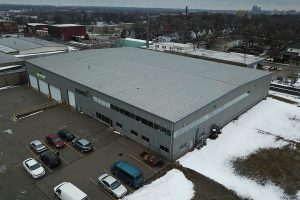
ATR’s facility in Grand Rapids, Mich. Photo courtesy of ATR.
An ITAD company’s growth in Michigan shows how partnering with nonprofit social service groups can present solid business-building opportunities.
Advanced Technology Recycling (ATR), an IT asset disposition (ITAD) company with nine facilities around the U.S., provides reverse logistics, data destruction, repair/refurbishment, resale, recycling and other services. Of the 20 million to 25 million pounds it handles each year, three-quarters or more comes from organizations, and the rest is residential material.
In January, ATR moved its Michigan location from Wyoming, Mich. into a larger space in neighboring Grand Rapids. The move expanded the location from a 17,000-square-foot “spoke” to a 30,000-square-foot “hub” for ATR. It has also led to the company working with a number of nonprofits organizations, which are not only leasing the space to ATR but are helping to vet and train employees and stabilize their home lives.
“It’s just a lot of resources all coming together,” said Brodie Ehresman, ATR’s national business development manager. “We wish we had this available at all of our sites.”
One of the nonprofit groups ATR is working with is Amplify GR, which was launched by the DeVos family (related to U.S. Education Secretary Betsy DeVos). Amplify GR works to improve jobs, housing and education in downtrodden areas of Grand Rapids. It is fixing up vacant commercial and industrial buildings and offering them at discounted rates, Ehresman said, noting that ATR is leasing space from the group in the Cottage Grove business district.
“We are the first company that they’ve selected. The entity hasn’t been on-line for too long,” he said. ATR was selected because it has offered free collections, including of CRTs, and its wages and benefits are better than many other area employers, he added.
Also involved are local social service group Seeds of Promise and workforce development program Michigan Works! Association. They’re helping area residents overcome impediments to stable employment – including education, health, child care, transportation and housing barriers – and are providing job training and recruitment services.
They’re allowing ATR to tap into “a wealth of resources,” Ehresman said. For example, ATR normally incurs costs related to employee recruiting, but Michigan Works! is handling those functions on its behalf. Employees are even receiving basic recycling training so they can decide whether the work is right for them before they start at ATR. Company leaders hope the support programs will help stabilize employees’ lives and reduce ATR’s employee turnover.
ATR is also working with a nonprofit organization called Local First, which is connecting it with local customers, he said.
In conjunction with the move, ATR is expanding its fleet and hiring more staff, according to an ATR press release. Changing from what the company considers a “spoke” in its network to a “hub” will mean greater volumes processed at the Michigan facility, which handled about 4 million pounds last year, Ehresman said. The location will be able to reduce the amount it ships to ATR sites in Illinois for processing.
ATR has been in the industry news of late because it was named in an export tracking report released by Basel Action Network (BAN) last month. ATR posted a lengthy rebuttal on its website addressing BAN’s allegation that a low-value LCD monitor handled by the processor had ended up Pakistan. That response and others from e-scrap companies has led BAN to issue a counter-statement.
More stories about processors
- Australian metals company rebrands, builds Texas plant
- E-scrap buyer launches AI to recognize circuit board grades
- Company debuts battery-containing device shredder



